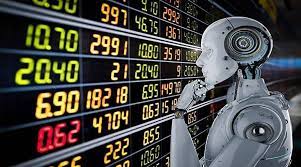In the ever-evolving landscape of financial markets, technological advancements continue to revolutionize trading practices. One such innovation that has gained significant traction in recent years is the forex robot. These automated trading systems promise efficiency, accuracy, and potentially lucrative opportunities for traders across the globe. But what exactly are Forex robots, and how do they work?
Understanding Forex Robots
Forex robots, also known as expert advisors (EAs) or automated trading systems, are software programs designed to execute trades on behalf of traders in the foreign exchange (Forex) market. They operate based on predefined trading algorithms and parameters, allowing them to analyze market conditions, identify trading opportunities, and place trades without human intervention.
These robots are typically developed using programming languages such as MetaQuotes Language (MQL) for the MetaTrader platform or Python for other trading platforms. Traders can either create their own custom algorithms or choose from a plethora of pre-built strategies available in the market.
How Forex Robots Work
Forex robots employ a variety of strategies to make trading decisions. Some rely on technical analysis indicators, such as moving averages, Relative Strength Index (RSI), or Fibonacci retracements, to identify potential entry and exit points. Others may utilize fundamental analysis, news sentiment analysis, or even machine learning algorithms to make informed trading decisions.
Once activated, a Forex robot continuously monitors the market, scanning for trading opportunities based on its programmed criteria. When it identifies a favorable trade setup, it automatically executes the trade according to the specified parameters, including entry price, stop-loss, take-profit levels, and position size.
Advantages of Forex Robots
- Elimination of Emotional Bias: One of the primary advantages of Forex robots is their ability to trade without emotions. Unlike human traders who may succumb to fear, greed, or hesitation, automated systems operate based on logic and predefined rules, thereby reducing the impact of emotional biases on trading decisions.
- 24/7 Trading: Forex robots can monitor the market round-the-clock, allowing traders to capitalize on trading opportunities across different time zones and sessions. This ensures that potential opportunities are not missed due to human limitations, such as sleep or other obligations.
- Backtesting and Optimization: Before deploying a Forex robot in live trading, traders can backtest their strategies using historical data to assess their performance under various market conditions. This enables them to refine and optimize their strategies for better results in live trading.
- Speed and Efficiency: Automated trading systems can execute trades with lightning-fast speed, enabling them to capitalize on fleeting market opportunities that may be missed by manual traders. Moreover, they can process vast amounts of market data and execute trades instantaneously, enhancing efficiency in trade execution.
Challenges and Risks
While Forex robots offer numerous benefits, they also come with certain challenges and risks that traders should be aware of:
- Over-Optimization: Traders may fall into the trap of over-optimizing their strategies based on past data, which could lead to poor performance in live trading when market conditions deviate from historical patterns.
- Technical Failures: Like any software, Forex robots are susceptible to technical glitches, bugs, or connectivity issues, which could potentially result in missed trades or erroneous executions.
- Market Volatility: Rapid changes in market conditions, particularly during periods of high volatility or news events, can pose challenges for automated trading systems, leading to unexpected losses or missed opportunities.
- Lack of Adaptability: While Forex robots can be highly effective in certain market conditions, they may struggle to adapt to abrupt changes or unconventional market behavior that falls outside their programmed parameters.
Conclusion
Forex robots have emerged as powerful tools for traders seeking to automate their trading activities and capitalize on market opportunities with efficiency and precision. By leveraging advanced algorithms and technology, these automated systems offer a range of benefits, including emotion-free trading, 24/7 availability, and rapid execution speeds.
However, it’s essential for traders to approach automated trading with caution, understanding the inherent risks and limitations associated with these systems. Proper strategy development, rigorous testing, and ongoing monitoring are crucial to maximizing the potential benefits of Forex robots while mitigating potential pitfalls.
Ultimately, while Forex robots can enhance trading efficiency and streamline decision-making processes, they should be viewed as complementary tools to human expertise rather than a substitute for diligent analysis and prudent risk management in the dynamic world of financial markets.


